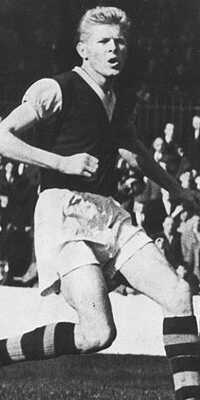|
Alderman Brooks (Conservative) was convinced he would overturn the Labour majority with new man Dan Jones standing in what was a two horse race. A total of 57,900 residents were eligible to vote (those over 21 only could vote in 1959) and Brooks said: "We will certainly win if we get a high poll."
In his final address Brooks confirmed he would fight socialism and stick to Conservative values whilst Jones, from the Rhondda Valley, said he had been humbled by the way in which Burnley folk had accepted him. Nationally it was Harold McMillan against Hugh Gaitskell but locally it was a fight between local man Alderman Edward Brooks and Welshman Dan Jones.
Such was the excitement that one couple, in Scarlett Street, set their bed on fire. There was much intrigue as to how their bedroom activities had got so hot as to cause a fire but once the fire brigade had been called it turned out that Mr Pool (aged 71) had been having his last cigarette of the day.
He had to be admitted to hospital whilst Mrs Pool (72) was placed in a nursing home for a few days until her husband was fit to return home.
As we look back to 1959 in this feature then well done to the residents of Brierfield in 1959 who themselves were looking back fifty years to 1909. That was the year that Congregational School in Chapel Street closed and was replaced by Walter Street School.
In 1909 the pupils had a procession from the old school to the new school and in 1959 those pupils met up again to make the same procession. Whether Walter Street School is celebrating its centenary this week we don't know, but there is little chance of any of its original pupils being around to celebrate as they'd done fifty years ago.
Football wise, Burnley had earned themselves a good point at White Hart Lane and were now extended their time away from the town with a game in Plymouth for Neil Dougall's testimonial.
Neil's dad Billy was now the physio at Turf Moor but was very much one of the 'inner circle' when it came to the coaching, along with manager Harry Potts and trainer Ray Bennion. Son Neil was now an assistant trainer with Plymouth having played almost 300 games for Argyle.
Burnley were delighted to have accepted the invitation to play and the party flew from London to Exeter before transferring to a coach for the remainder of the journey to Plymouth.
We played a strong team too. Jimmy McIlroy was not on the trip because of international duty and John Connelly was with the England Under-23s. Billy White had played at Spurs for McIlroy whilst Gordon Harris, who had played just two first team games in the previous season was the replacement for Connelly. Other than that, Jimmy Adamson apart, it was a full strength team and Plymouth had no answer.
Burnley gave a powerful and impressive display. Pointer was the livewire of the Burnley attack having two goals disallowed in the first half and hitting the framework of the goal. Burnley were faster on the ball than Argyle, and had a better understanding in the link up between defence and forwards.
White gave Burnley the lead soon after the start and Harris increased it before Pointer netted a third. Pointer scored two more after the interval with Pilkington, playing on the right wing, also helping to demonstrate his team's superiority with a goal. Govan scored for Plymouth.
The Burnley team was: Adam Blacklaw, John Angus, Alex Elder, Bobby Seith, Tommy Cummings, Brian Miller, Brian Pilkington, Billy White, Ray Pointer, Jimmy Robson, Gordon Harris.
